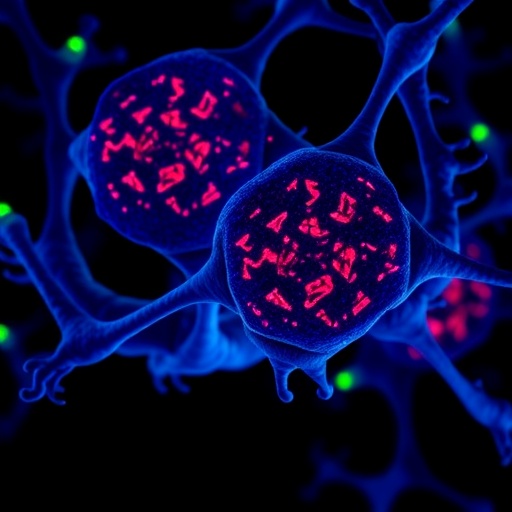Nearly Four Decades After Its Discovery, a Well-Known Protein Emerges as a Key Player in Cancer Immune Evasion
For nearly 40 years, erythropoietin (EPO) has been recognized primarily for its role in stimulating red blood cell production, a critical function in the body’s response to anemia and hypoxia. However, groundbreaking new research reveals that EPO plays a far more complex and sinister role within the tumor microenvironment, specifically acting as an immunosuppressive agent that helps tumors evade the immune system. This paradigm-shifting discovery not only deepens our understanding of cancer biology but also opens the door to innovative treatments capable of transforming previously immune-resistant tumors into targets vulnerable to immunotherapy.
A team of researchers, led by Dr. Edgar Engleman, MD, PhD, at Stanford University, has uncovered that EPO, traditionally seen as a hematopoietic growth factor, functions as a critical switch within the immune landscape of cancer. The study, published in the prestigious journal Science on April 24, 2025, demonstrates that by blocking EPO signaling, formerly “cold” tumors—those that evade immune detection—can be converted into “hot” tumors, rich with activated cancer-fighting immune cells, particularly T lymphocytes. This transformation holds profound therapeutic implications, especially when combined with immune checkpoint inhibitors like anti-PD-1 antibodies, such as the commercially available Keytruda.
Cold tumors are a notorious challenge in oncology because their immune-resistant nature allows unchecked cancer growth. Dr. Engleman’s group utilized sophisticated genome editing techniques to develop multiple mouse models of liver cancer that closely mirror human disease, including its genetic mutations, histological features, and response patterns to existing therapies. Leveraging these models, they observed that tumors exhibiting resistance to anti-PD-1 therapy also showed markedly elevated levels of EPO compared to tumors infiltrated by immune cells. This correlation indicated a previously unappreciated role for EPO in fostering an immunosuppressive tumor microenvironment.
Further investigation revealed that tumor-associated hypoxia, a hallmark of many solid tumors, is a driving force behind the increased expression of EPO within cold tumors. Hypoxia stimulates cancer cells to produce signals that elevate EPO levels, which, in turn, act on macrophages within the tumor. These macrophages, once activated by EPO through its receptor, shift towards an immunosuppressive phenotype, actively repelling T cells and quelling their anti-cancer activities. This crosstalk essentially creates an immune-privileged niche, enabling tumors to grow unchecked and resist current immunotherapies.
Strikingly, when the researchers genetically disrupted the tumor cells’ ability to produce EPO, the formerly cold tumors transformed into hot, inflamed tumors, abundant with active T cells. Conversely, artificially elevating EPO levels in hot tumors induced immune suppression, enabling tumor progression. These elegant experiments solidify the causal role of tumor-derived EPO as an immunosuppressive switch, shifting the tumor-immune balance toward immune evasion.
To probe the therapeutic potential of these findings, the team evaluated the combined blockade of the EPO signaling pathway and PD-1. In murine models carrying cold liver tumors, neither anti-PD-1 therapy nor controls alone improved survival beyond eight weeks post tumor induction. However, mice engineered to have macrophages deficient in EPO receptors exhibited significantly extended survival, with 40% alive at 18 weeks after tumor initiation. Strikingly, when these macrophage-specific EPO receptor knockout mice received anti-PD-1 therapy, survival extended to the full duration of the experiment, with complete tumor regression in most cases.
These results underscore that interrupting EPO signaling effectively reactivates the immune system’s ability to recognize and destroy tumors, overcoming one of the major barriers in cancer immunotherapy. Dr. Engleman emphasized that targeting EPO or its receptor could complement existing checkpoint blockade therapies, thus widening the spectrum of cancers responsive to immunotherapy—particularly liver, pancreatic, colorectal, breast, and prostate cancers, which are typically resistant to anti-PD-1 therapy.
The clinical implications extend beyond liver cancer, as analyses of patient tumor databases revealed a consistent association between high EPO expression and poorer survival across multiple tumor types, including kidney, breast, colon, and skin cancers. This highlights EPO’s broader role as a central regulator within the tumor microenvironment’s immune modulation.
Despite the promise, Dr. Engleman cautions against indiscriminate systemic inhibition of EPO due to its essential physiological role in red blood cell production, raising concerns about anemia as a potential side effect. As an alternative, strategies are under exploration to selectively target EPO receptors expressed on tumor-associated macrophages, aiming to disrupt immunosuppression without compromising erythropoiesis. This targeted approach may offer a safer therapeutic window while enhancing immune-mediated tumor clearance.
This discovery also provides a mechanistic explanation for previous clinical observations that administration of EPO to cancer patients with anemia sometimes accelerated tumor growth—a phenomenon that had puzzled clinicians and researchers for years and led to FDA black box warnings on EPO drugs. By elucidating EPO’s immunosuppressive function within tumors, the study reconciles these clinical findings within a comprehensive biological framework.
The interdisciplinary collaboration for this research included contributions from the New York Blood Center and ImmunEdge Inc., a biotechnology company co-founded by Dr. Chiu, the study’s lead author, and Dr. Engleman. Their joint efforts exemplify how academic and industrial partnerships can accelerate the translation of basic scientific insights into therapeutic innovations.
Looking forward, Dr. Engleman and his team are advancing preclinical development of EPO pathway inhibitors and designing clinical strategies to test their efficacy in human cancers. The anticipated integration of EPO receptor blockade with immune checkpoint therapy holds promise to not only improve patient outcomes but also to expand the reach of immunotherapy to presently refractory cancers.
This pioneering research reshapes fundamental concepts in cancer immunity by unveiling an unexpected role for erythropoietin—a decades-old molecule—in modulating tumor immune escape. As the field embraces these insights, the future of cancer treatment may soon harness EPO-targeted strategies to reinvigorate anti-tumor immunity and bring new hope to patients worldwide.
Subject of Research: Animals
Article Title: Tumor-derived erythropoietin acts as an immunosuppressive switch in cancer immunity
News Publication Date: 24-Apr-2025




